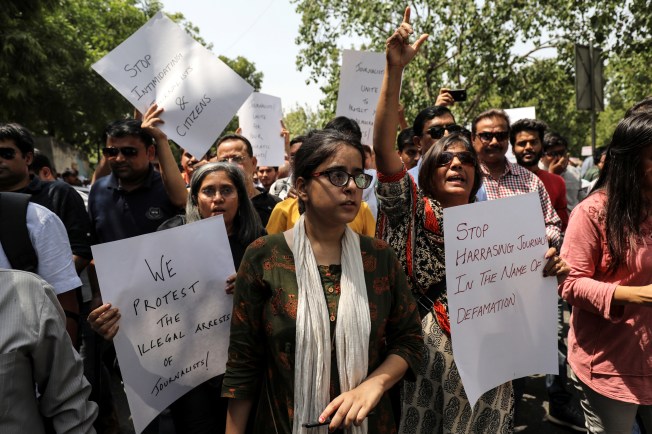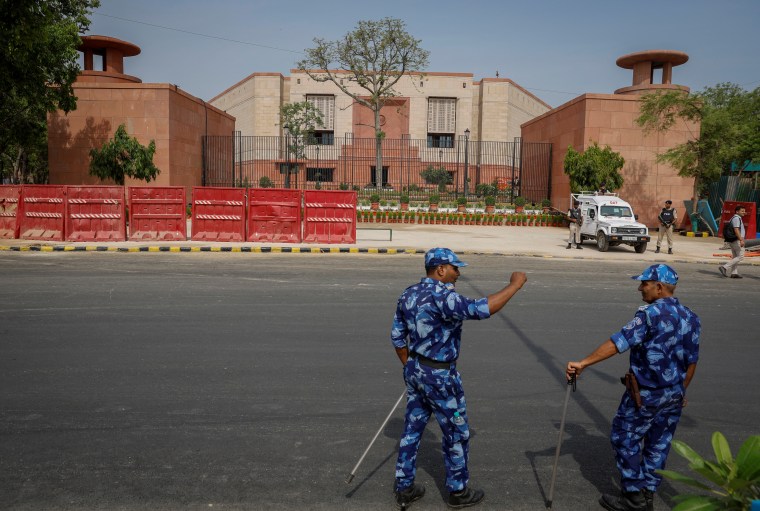New York, August 25, 2023—Indian lawmakers must thoroughly review three bills that threaten the independence of the press, and the government should withdraw and significantly amend its new data protection law, the Committee to Protect Journalists said Friday.
“We are gravely concerned by the Indian government’s apparent attempts to pass a series of bills undermining press freedom, ahead of elections in 2024, without adequately consulting journalists or civil society,” said Beh Lih Yi, CPJ’s Asia program coordinator, in Kuala Lumpur. “Indian lawmakers must allow ample time for a transparent and exhaustive review of the bills, and the government should withdraw and substantially revise the Digital Personal Data Protection Act, which provides a dangerous framework for the expansion of surveillance and censorship.”
On August 3, India’s upper house of parliament passed the Press and Registration of Periodicals Bill, 2023, which is set to replace an 1867 law. The Editors Guild of India described its provisions “draconian” as they widen “the powers of the State to have more intrusive and arbitrary checks into the functioning of newspapers and magazines.”
If passed by the lower house and the president, the bill would expand the powers of the government’s Press Registrar to deny registration to anyone convicted of a “terrorist act” or “unlawful activity” as defined under the country’s anti-terror law, or “having done anything against the security of the State.” It would also allow any other “specified authority” to enter the premises of a publication “to inspect or take copies of the relevant records or documents or ask any questions necessary for obtaining any information.”
Separately, on August 11, Home Minister Amit Shah introduced several criminal law bills, which a parliamentary committee began discussing on August 24. Three opposition lawmakers on the committee protested at the short notice.
The first proposed bill, overhauling the colonial-era Penal Code, intends to replace the crime of sedition with a broader and more ambiguous clause, stating that those who encourage “feelings of separatist activities” or endanger the “sovereignty, unity and integrity of India” can be imprisoned for seven years to life, up from the current three years to life. The sedition law has been used repeatedly to jail and harass journalists.

The second proposed bill, a replacement of the Code of Criminal Procedure, 1973, would allow the officer-in-charge of a police station to summon any document or device “likely to contain digital evidence” for an investigation or trial, without oversight. It also proposed to extend the maximum period that police may detain someone without charge from 15 to 60 or 90 days, depending on the nature of the accusations.
Separately, the Digital Personal Data Protection Act, 2023, which came into force on August 12 after being rushed through parliament in six days, has been criticized by local press groups as likely to stifle investigative journalism as it could compel reporters to reveal their sources.
The law empowers the central government to ask any entity that processes data—including journalists, news organizations, and social media companies—to hand over information, “thereby converting every private company into an instrument of surveillance,” according to DIGIPUB News India Foundation, an association of journalists working in digital media.
Social media companies are “highly likely to comply” with orders to hand over journalists’ data, rather than risk retaliation such as fines or blocking of their content, Prateek Waghre, policy director at the digital rights organization Internet Freedom Foundation, told CPJ.
The act also includes a right to the “erasure of personal data,” which could allow someone who shared personal information with a journalist to petition the government-appointed Data Protection Board for a news article to be removed, even if the reporting was in the public interest.
Further, the act empowers the government to block the content of any journalist, news organization, or social media platform that has been fined twice before for failing to comply with any aspect of the law if authorities believe doing so would be “in the interests of the general public.”
That section of the law expands the government’s censorship powers beyond the Information Technology Act, 2000, which has been repeatedly used to block social media accounts of journalists and news organizations, including this month The Kashmir Walla and Gaon Savera.
The new law also amends the country’s Right to Information Act, 2005, a key tool for journalists to access government data on issues like corruption and rights violations, by allowing government officers to reject requests involving “personal information.”
That amendment “severely obstructs the ability of journalists to seek information in the public interest,” Geeta Seshu, founding editor of the Free Speech Collective watchdog group, told CPJ.
CPJ’s emails to Information and Broadcasting Minister Anurag Singh Thakur, Home Secretary Ajay Kumar Bhalla, and Electronics and Information Technology Minister Ashwini Vaishnaw did not receive any replies.
